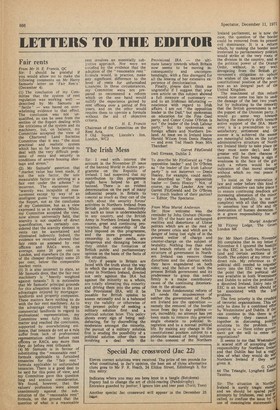The Irish Mess
Sir: I read with interest the account in the November 27 issue of the banned World in Action programme on the Republic of Ireland. I had suspected that my contribution to this programme might have helped to get it banned. There is an evident determination on the part of many influential people in Britain to conceal as much as they can of the truth about the security forces' activities in Northern Ireland from British public opinion. Sensitivity on such an issue is understandable in any country, and the British Army in Northern Ireland faces, of course, great and continuing provocation. But censorship of the kind imposed on this programme, and the more general autocensorship in other media, are dangerous and damaging because they inhibit the formation of British public and parliamentary opinion on the basis of the facts of the situation.
Only if people in Britain are faced with the truth about the way in which the actions of the British Army in Northern Ireland, directed not only against the IRA but against the minority as a whole, are totally alienating this minority and driving them into the arms of the Provisional IRA, will it be possible for British opinion to assess rationally and in a balanced way the validity or otherwise of the present policy of seeking a military solution first and a political solution later. This policy shows every sign of being selfdefeating, for by discrediting the moderates amongst the minority, the pursuit of a military solution first is eroding the possibility of a political solution other than one involving a deal with the
Provisional IRA -the ultimate lunacy towards which Britain now seems to be moving inconsequently and uncomprehendingly, with a fine disregard for all the lessons of her extensive experience of decolonisation.
Finally, please don't think me ungrateful if I suggest that your own article on this subject showed a full measure of customary — and to an Irishman infuriating — nescience with regard to Irish affairs. I am not "the opposition leader in the Dail," but spokesman on education for the Fine Gael party, and Conor Cruise O'Brien is not "the leader of the Irish Labour party," but its spokesman on foreign affairs and Northern Ireland. At least we in Ireland know Harold Wilson from Denis Healey — and even Ted Heath from Mrs Thatcher!
Garret FitzGerald Dail Eireann, Dublin 2.
To describe Mr FitzGerald as "the opposition leader" and Dr O'Brien as "the leader of the Irish Labour party" is not incorrect — Denis Healey, for example, could easily be described as "the opposition leader —. Denis Healey." Not, of course, as the Leader. Are not Garret FitzGerald and Dr O'Brien very much leaders of their parties? — Editor, The Spectator.










































 Previous page
Previous page